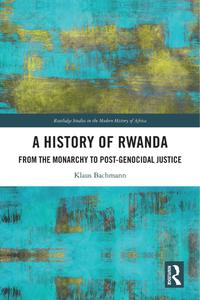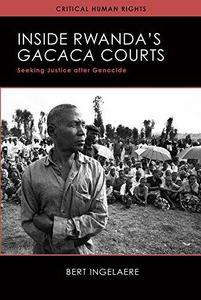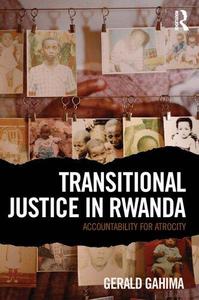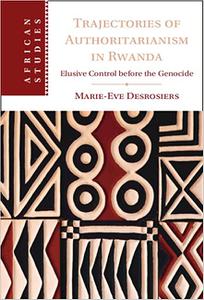
Free Download A History of Rwanda: From the Monarchy to Post-genocidal Justice
by Klaus Bachmann
English | 2023 | ISBN: 1032272341 | 275 pages | True PDF | 7.55 MB
Полная новость
- Книги
- 8-03-2023, 01:54
- 108
- 0
- voska89

Free Download Inside Rwanda's /Gacaca/ Courts: Seeking Justice after Genocide (Critical Human Rights) By Bert Ingelaere
2016 | 256 Pages | ISBN: 0299309703 | PDF | 52 MB
After the 1994 genocide in Rwanda, victims, perpetrators, and the country as a whole struggled to deal with the legacy of the mass violence. The government responded by creating a new version of a traditional grassroots justice system called gacaca. Bert Ingelaere, based on his observation of two thousand gacaca trials, offers a comprehensive assessment of what these courts set out to do, how they worked, what they achieved, what they did not achieve, and how they affected Rwandan society.Weaving together vivid firsthand recollections, interviews, and trial testimony with systematic analysis, Ingelaere documents how the gacaca shifted over time from confession to accusation, from restoration to retribution. He precisely articulates the importance of popular conceptions of what is true and just. Marked by methodological sophistication, extraordinary evidence, and deep knowledge of Rwanda, this is an authoritative, nuanced, and bittersweet account of one of the most important experiments in transitional justice after mass violence.
Полная новость
- Книги
- 4-03-2023, 20:20
- 100
- 0
- voska89

Free Download Killing Neighbors: Webs of Violence in Rwanda By Lee Ann Fujii
2009 | 224 Pages | ISBN: 0801447054 | PDF | 2 MB
In the horrific events of the mid-1990s in Rwanda, tens of thousands of Hutu killed their Tutsi friends, neighbors, even family members. That ghastly violence has overshadowed a fact almost as noteworthy: that hundreds of thousands of Hutu killed no one. In a transformative revisiting of the motives behind and specific contexts surrounding the Rwandan genocide, Lee Ann Fujii focuses on individual actions rather than sweeping categories. Fujii argues that ethnic hatred and fear do not satisfactorily explain the mobilization of Rwandans one against another.Fujii's extensive interviews in Rwandan prisons and two rural communities form the basis for her claim that mass participation in the genocide was not the result of ethnic antagonisms. Rather, the social context of action was critical. Strong group dynamics and established local ties shaped patterns of recruitment for and participation in the genocide. This web of social interactions bound people to power holders and killing groups. People joined and continued to participate in the genocide over time, Fujii shows, because killing in large groups conferred identity on those who acted destructively. The perpetrators of the genocide produced new groups centered on destroying prior bonds by killing kith and kin.
Полная новость

Transitional Justice in Rwanda: Accountability for Atrocity By Gerald Gahima
2012 | 432 Pages | ISBN: 0415522781 | PDF | 3 MB
Transitional Justice in Rwanda: Accountability for Atrocity comprehensively analyzes the full range of the transitional justice processes undertaken for the Rwandan genocide. Drawing on the author's extensive professional experience as the principal justice policy maker and the leading law enforcement officer in Rwanda from 1996-2003, the book provides an in-depth analysis of the social, political and legal challenges faced by Rwanda in the aftermath of the genocide and the aspirations and legacy of transitional justice. The book explores the role played by the accountability processes not just in pursuing accountability but also in shaping the reconstruction of Rwanda's institutions of democratic governance and political reconciliation. Central to this exploration will be the examination of whether or not transitional justice in Rwanda has contributed to a foundational rule of law reform process. While recognizing the necessity of pursuing accountability for mass atrocity, the book argues that a maximal approach to accountability for genocide may undermine the promotion of core objectives of transitional justice. Taking on one of the key questions facing practitioners and scholars of transitional justice today, the book suggests that the pursuit of mass accountability, particularly where socio-economic resources and legal capacity is limited, may destabilize the process of rule of law reform, endangering core human rights norms. Moreover, the book suggests that pursuing a strategy of mass accountability may undermine the process of democratic transition, particularly in a context where impunity for crimes committed by the victors of armed conflicts persists. Highlighting the ongoing democratic deficit in Rwanda and resulting political instability in the Great Lakes region, the book argues that the effectiveness of transitional justice ultimately hinges on the nature and success of political transition.
Полная новость
- Книги
- 23-01-2023, 01:53
- 109
- 0
- voska89

Marie-Eve Desrosiers, "Trajectories of Authoritarianism in Rwanda: Elusive Control before the Genocide "
English | ISBN: 1009224786 | 2023 | 279 pages | PDF | 2 MB
Challenging assumptions regarding the strength and control of authoritarian governments in Rwanda in the decades before the 1994 genocide, Marie-Eve Desrosiers uses original archival data and interviews to highlight the complex relations between authorities, opponents, and society. Through careful, detailed analysis Desrosiers offers a nuanced assessment of the functions and evolution of authoritarianism over time, demonstrating how the governments of Rwanda's first two post-independence Republics (1962-1990) sought and often struggled to cement their rule. Whilst the deeper, lived realities of authoritarianism are generally neglected by multi-cases comparisons at the heart of comparative authoritarian studies, this illuminating survey highlights the essential, yet subtle authoritarian strategies, patterns, and forms of decay that are too often overlooked when addressing authoritarian contexts.
Полная новость
